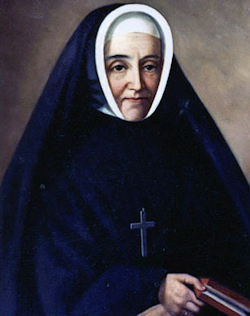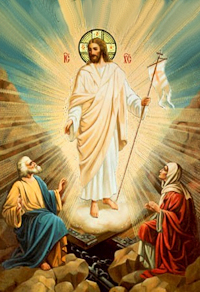Easter: April 18th
Wednesday of the Second Week of Easter
Other Commemorations: Bl. Marie-Anne Blondin, Virgin (RM; Optional Memorial in CAN)
» Enjoy our Liturgical Seasons series of e-books!
God loved the world so much that he gave his only Son, so that everyone who believes in him may not be lost but may have eternal life. For God sent his son into the world not to condemn the world, but so that through him the world might be saved. No one who believes in him will be condemned, but whoever refuses to believe is condemned already, because he has refused to believe in the name of God's only Son.
Meditation
The living water which Jesus says, quenches thirst forever, is the stream of grace, continually flowing from the Sacraments of the Church, from the inexhaustible merits of Christ, which purifies us from sin, extinguishes the fire of evil desires, quiets the thirst for eternal joys, and renders our will fertile in the performance of good works. As often as we receive the holy Sacraments with lively faith in Jesus, and with the ardent desire for His graces, so often do we drink from this stream, to which we are invited by the Church by these words: "You shall draw waters with joy, out of the Savior's fountains" (Is. 12:3). When saying that God is a spirit, who must therefore be adored in spirit and in truth, Jesus rebukes the Jews who, as has been already observed, directed their attention only to the external ceremonies and customs of the Church, and forgot the true conversion of their hearts, as well as the Samaritans who built a temple on Mount Garizim, arbitrarily arranged their form of worship, and frequently mixed it with heathen superstition. The will of His Father, to redeem and sanctify man, was the food of Jesus. So you also let your nourishment be the will of God who requires of you to love Him with all your heart, and to keep His commandments. — The Church's Year by Rev. Fr. Leonard Goffine
Bl. Marie-Anne Blondin
 Esther Blondin was born on April 18, 1809 to a Catholic farm family in a rural community in Quebec, Canada. Her mother taught her to worship at the Eucharist and recognize Divine Providence. Her father taught her to have a strong faith and to be patient in times of suffering.
Esther Blondin was born on April 18, 1809 to a Catholic farm family in a rural community in Quebec, Canada. Her mother taught her to worship at the Eucharist and recognize Divine Providence. Her father taught her to have a strong faith and to be patient in times of suffering.
As a young woman, Esther worked as a domestic in her village to help her family. Drawn to vowed religious life, she joined the Congregation of the Sisters of Notre Dame. Illiterate, she learned to read and to write at age 22 as she went about the work of the Sisters. Ill health forced her to give up her dream of becoming a Sister of the Congregation of Notre Dame. After a time of rest, she was Esther became a teacher and then the principal of the school. Later she would train young teachers who taught in small country schools.
Healthy and mature, in 1850, Esther, with permission from the local Bishop, founded the Congregation of the Sisters of St. Anne and became the first Mother Superior, taking the name Marie-Anne.
In the following years, the congregation grew and expanded throughout Canada and the US New England states. And while the Congregation attracted more women seeking vowed religious life, the Foundress faced internal discord with the new chaplain assigned by the Church to oversee the group. She wrote, “As for me, my Lord, I bless Divine Providence a thousand times for the maternal care she shows me in making me walk the way of tribulations and crosses.” (Vatican document)
The foundress was deposed and relegated to the position of laundress, a position she accepted in order to minimize friction and distractions, helping to ensure the further development of the congregation. As is the way when one has trust in Divine Providence, Sister Marie-Anne was now able to personally teach the novices as they worked alongside of her.
One novice, surprised to learn that this simple woman was the foundress of the Sisters of St. Anne asked her why she, the foundress, was doing laundry. Her response:
“The deeper a tree sinks its roots into the soil, the greater its chances of growing, branching out, and bearing fruit.”
She also taught through her life and actions that “There is more happiness in forgiving than in revenge.”
On her deathbed, Sister Marie-Anne said to her sisters, “May Holy Eucharist and perfect abandonment to God’s will be your heaven on earth”. She went home to her “Good God” on January 2, 1890.
Sister Marie-Anne’s example of humility, obedience, forgiveness, and non-violence continue to speak to us today. We continue her mission to those whom God has put in our path, regardless of where the path is located.
In 2001, she was beatified by Pope St. John Paul II.
—Taken from Sisters of St. Anne
Highlights and Things to Do:
- Read more about Blessed Marie-Anne:
- Find out more about the Sisters of St. Anne which she founded.
- Listen to the CatholicSaints.info podcast about Bl. Marie-Anne.
- Read a short History of Her Cause






